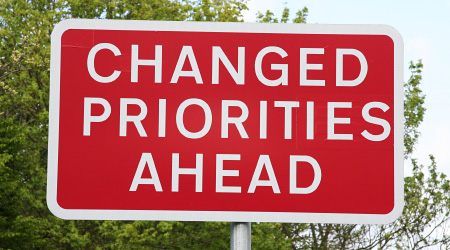What To Pay First When In Debt

Being overwhelmed by excessive debt can make it difficult to see the forest for the trees. Sometimes all you can see is a pile of bills and realize you don't have enough money to pay them all. Owing more than you make means you will have to prioritize what gets paid first and if anything gets paid to those items further down on the list. Paying a bill with the largest overdue stamp won't solve the problem and is unlikely to result in any long-term solutions. Let's take a look what to pay first when in debt.
Household Bills
Household bills encompass those items which are necessary to function in any reasonable capacity. The mortgage payment should always be the first thing paid each month regardless of any other existing debt or financial obligations. Utilities are the second most important household bill since without water, electricity and gas a house is just four walls and a roof. Not all household bills are created equally however which may mean canceling television, phone and other nonessential services.
High Interest Debt
The average consumer has between six and eight credit cards and roughly $8,000 in credit card debt. Many of these balances will have punitive interest rates of 21% or more in addition to penalty fees added every month. Eliminating or consolidating high-interest rate debt solves multiple problems. Use a home equity line of credit or balance transfer checks to try and consolidate as much high-interest rate debt as possible into a single low interest rate and monthly payment. This means more of your payment goes to principal reducing debt faster. It also frees up additional monthly income to tackle other bills.
Vehicle and Insurance
Most consumers need a vehicle to get to and from work and is a necessary expense for daily living. While not as important as paying a mortgage or saving thousands of dollars from high interest rate debt, a vehicle is still a requirement for most consumers. If you miss too many payments, vehicle repossession is a serious consideration which may leave you worse off. A few payments can be missed however which will appear negatively on your credit report. Insurance can be modified to cover liability only if you own the vehicle outright saving hundreds or thousands of dollars a year in premiums.
Contribute to Savings
It may sound counterintuitive to pay yourself before paying off outstanding debt but many consumers are in the position they're in due to the lack of an emergency fund. Start or continue to contribute to your emergency savings account even if it's for a nominal amount like $10-$20 per month. Any additional savings may mean having funds available for an unexpected car repair preventing the need to take out a title or payday loan. Even $500 in emergency savings may make the difference and prevent a vehicle repossession or having the electricity turned off in your home.
Medical and Student Loans
Some loans are secured and some are unsecured in nature. Medical and student loans are unsecured and therefore not a top priority for repayment. While it is always recommended to pay what you owe, specific priorities like shelter, food and transportation take precedent over medical and student loans. Loan originators for these types of debts also have significant latitude in repayment terms and are able to defer payment, reduce monthly payment amounts and renegotiate terms as necessary.
Everything Else
It's the nature of the world that not everything goes as planned and many lenders understand this when extending credit. An unsecured furniture loan may never get repaid and sent to collections at which point the collector can settle for pennies on the dollar or pursue legal action. Regardless of any other outstanding debts, some are required for living and some are white noise. Always be polite and professional, explain your current financial situation and try to reach an agreement if possible. If not, then keep paying those bills which are most important until you are financially secure again.







